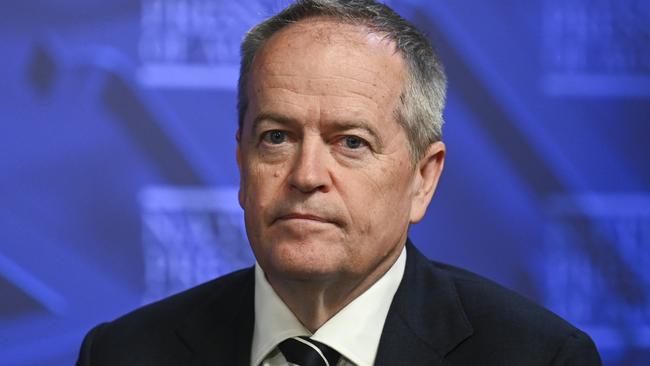Bill Shorten says he’s ‘agnostic’ about how autistic children supported
Bill Shorten says the NDIS won’t pay unregistered providers and has put the sector on notice over returns to businesses providing disability services.

Bill Shorten says the NDIS will no longer pay unregistered providers and has put the sector on notice by declaring it is not the job of the government to ensure 20 to 40 per cent returns to businesses providing disability services.
It follows the release of the long-awaited NDIS Review on Thursday, which made 26 recommendations for sweeping changes to the scheme including that all disability providers are registered.
The change – aimed to improve quality and stop people charging too much for services – will impact 150,000 unregistered providers.
“Let’s be clear, not every registered provider is a saint and many unregistered service providers do good work … but there’s got to be accountability,” Mr Shorten told the National Press Club. “How we maintain the social license of this scheme is by prioritising the best interest of people with disability and (having) a sense that all of us as Australians are confident that they’re not being ripped off.”
Mr Shorten said “good businesses” in the disability sector had nothing to worry about as reforms to the sector were rolled out.
“As for some particular business models, it’s not the job of the government to create NDIS millionaires,” he said. “The aim of the scheme is not to see double-digits those 20 per cent, 30 per cent, 40 per cent returns to particular businesses. It’s to look after the people on the scheme and their families.”
Mr Shorten’s comments come as fresh figures released by ability benchmarking organisation, Ability Roundtable, found more than 60 per cent of providers incurred a 2022-23 loss and forecast the current financial year would be worse.
He also took aim at providers of dodgy services not backed by any evidence.
“Evidence-based supports that deliver real beneficial outcomes are in … dolphins, overseas cruises and crystal therapies are out,” he said.
And “slum landlords” who were using house and living supports to take advantage of people with cognitive disabilities also should be rooted out.
“We should not allow this to continue. We have to get rid of the rorters and the criminals and the slum landlords … and we need to develop rules that are clear, transparent and fair,” Mr Shorten said.
Among the NDIS review’s recommendations was a call to end automatic access to the $42bn a year scheme based on medical diagnosis. Instead, a person’s needs or “functional impairment” – which refers to the impact their condition has on their daily lives – will be used to assess whether they are eligible for the scheme. The change has raised questions over how children with autism – almost 270,000 on the scheme – will be supported going forward.
Mr Shorten conceded there was no modelling around how many of such children would come off the NDIS following the implementation of the changes in two years’ time, but declared he was “agnostic” about if they would be supported by the scheme or expanded foundational supports.
“Your child may need a modest amount of support that should be found in mainstream settings like schools and kindergartens and childcare through the foundational supports which will be ramped up through initial investment,” he said.
States and territories agreed to a 50-50 funding deal with the Commonwealth on Wednesday to strengthen foundational supports, to ensure the NDIS stopped acting as “the only lifeboat in the ocean” for people with disabilities.







